GSP165 Contract Law: Offer, Termination, and Breach Analysis
VerifiedAdded on 2023/06/15
|6
|1272
|429
Homework Assignment
AI Summary
This assignment delves into the principles of contract law, focusing on offer, acceptance, termination, and breach of contract. It addresses scenarios involving contract breaches, such as delays in construction and failure to deliver materials, and explores available remedies like monetary damages and specific performance. The assignment also examines situations that do not constitute valid offers, like invitations to tender and public advertisements. Furthermore, it includes multiple-choice questions testing understanding of contract law concepts and their application. This document is contributed by a student and is available on Desklib, a platform offering a range of study tools, including past papers and solved assignments.

Running head: CONTRACT LAW
Contract Law
Name of the Student
Name of the University
Author note
Contract Law
Name of the Student
Name of the University
Author note
Paraphrase This Document
Need a fresh take? Get an instant paraphrase of this document with our AI Paraphraser
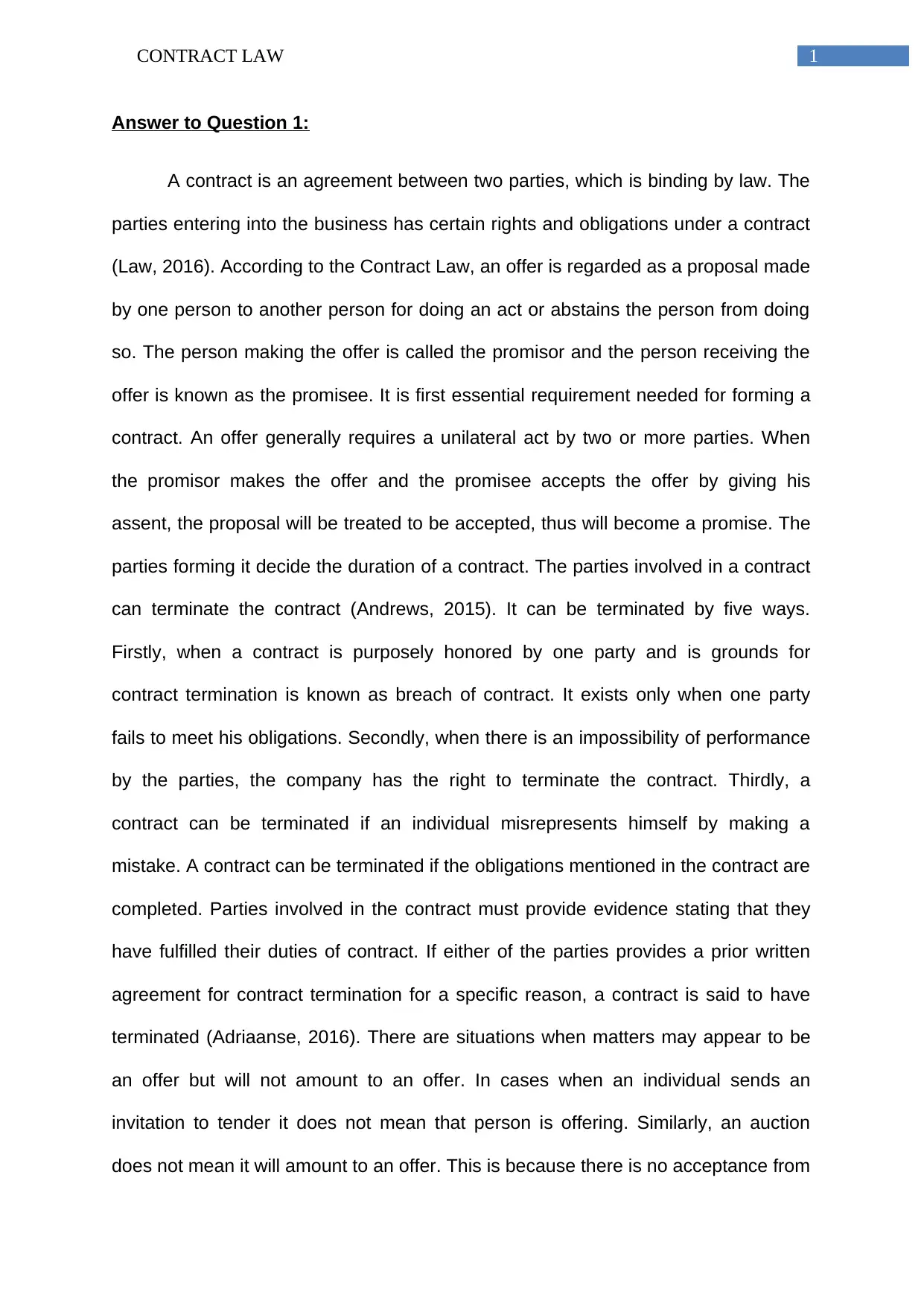
1CONTRACT LAW
Answer to Question 1:
A contract is an agreement between two parties, which is binding by law. The
parties entering into the business has certain rights and obligations under a contract
(Law, 2016). According to the Contract Law, an offer is regarded as a proposal made
by one person to another person for doing an act or abstains the person from doing
so. The person making the offer is called the promisor and the person receiving the
offer is known as the promisee. It is first essential requirement needed for forming a
contract. An offer generally requires a unilateral act by two or more parties. When
the promisor makes the offer and the promisee accepts the offer by giving his
assent, the proposal will be treated to be accepted, thus will become a promise. The
parties forming it decide the duration of a contract. The parties involved in a contract
can terminate the contract (Andrews, 2015). It can be terminated by five ways.
Firstly, when a contract is purposely honored by one party and is grounds for
contract termination is known as breach of contract. It exists only when one party
fails to meet his obligations. Secondly, when there is an impossibility of performance
by the parties, the company has the right to terminate the contract. Thirdly, a
contract can be terminated if an individual misrepresents himself by making a
mistake. A contract can be terminated if the obligations mentioned in the contract are
completed. Parties involved in the contract must provide evidence stating that they
have fulfilled their duties of contract. If either of the parties provides a prior written
agreement for contract termination for a specific reason, a contract is said to have
terminated (Adriaanse, 2016). There are situations when matters may appear to be
an offer but will not amount to an offer. In cases when an individual sends an
invitation to tender it does not mean that person is offering. Similarly, an auction
does not mean it will amount to an offer. This is because there is no acceptance from
Answer to Question 1:
A contract is an agreement between two parties, which is binding by law. The
parties entering into the business has certain rights and obligations under a contract
(Law, 2016). According to the Contract Law, an offer is regarded as a proposal made
by one person to another person for doing an act or abstains the person from doing
so. The person making the offer is called the promisor and the person receiving the
offer is known as the promisee. It is first essential requirement needed for forming a
contract. An offer generally requires a unilateral act by two or more parties. When
the promisor makes the offer and the promisee accepts the offer by giving his
assent, the proposal will be treated to be accepted, thus will become a promise. The
parties forming it decide the duration of a contract. The parties involved in a contract
can terminate the contract (Andrews, 2015). It can be terminated by five ways.
Firstly, when a contract is purposely honored by one party and is grounds for
contract termination is known as breach of contract. It exists only when one party
fails to meet his obligations. Secondly, when there is an impossibility of performance
by the parties, the company has the right to terminate the contract. Thirdly, a
contract can be terminated if an individual misrepresents himself by making a
mistake. A contract can be terminated if the obligations mentioned in the contract are
completed. Parties involved in the contract must provide evidence stating that they
have fulfilled their duties of contract. If either of the parties provides a prior written
agreement for contract termination for a specific reason, a contract is said to have
terminated (Adriaanse, 2016). There are situations when matters may appear to be
an offer but will not amount to an offer. In cases when an individual sends an
invitation to tender it does not mean that person is offering. Similarly, an auction
does not mean it will amount to an offer. This is because there is no acceptance from
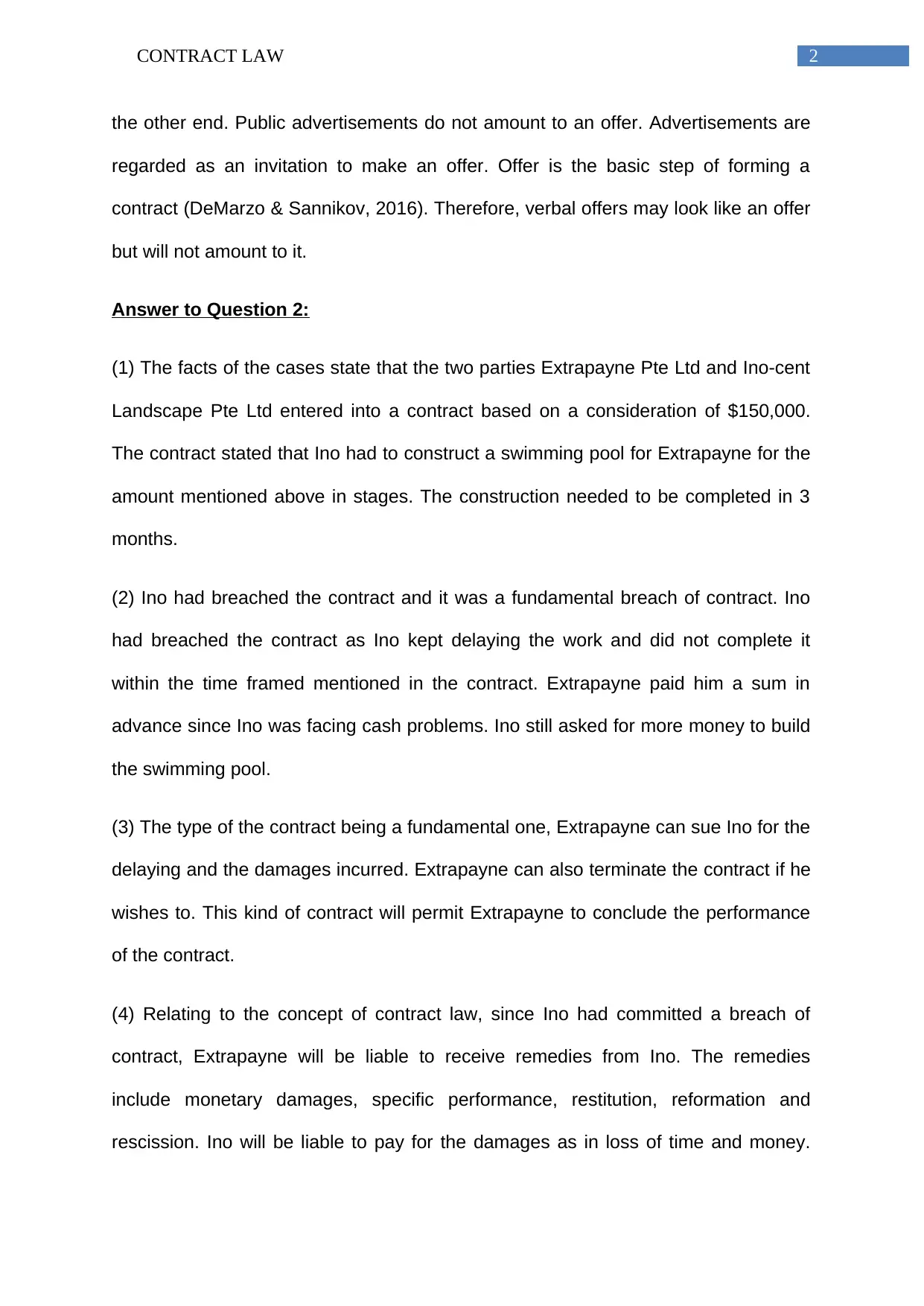
2CONTRACT LAW
the other end. Public advertisements do not amount to an offer. Advertisements are
regarded as an invitation to make an offer. Offer is the basic step of forming a
contract (DeMarzo & Sannikov, 2016). Therefore, verbal offers may look like an offer
but will not amount to it.
Answer to Question 2:
(1) The facts of the cases state that the two parties Extrapayne Pte Ltd and Ino-cent
Landscape Pte Ltd entered into a contract based on a consideration of $150,000.
The contract stated that Ino had to construct a swimming pool for Extrapayne for the
amount mentioned above in stages. The construction needed to be completed in 3
months.
(2) Ino had breached the contract and it was a fundamental breach of contract. Ino
had breached the contract as Ino kept delaying the work and did not complete it
within the time framed mentioned in the contract. Extrapayne paid him a sum in
advance since Ino was facing cash problems. Ino still asked for more money to build
the swimming pool.
(3) The type of the contract being a fundamental one, Extrapayne can sue Ino for the
delaying and the damages incurred. Extrapayne can also terminate the contract if he
wishes to. This kind of contract will permit Extrapayne to conclude the performance
of the contract.
(4) Relating to the concept of contract law, since Ino had committed a breach of
contract, Extrapayne will be liable to receive remedies from Ino. The remedies
include monetary damages, specific performance, restitution, reformation and
rescission. Ino will be liable to pay for the damages as in loss of time and money.
the other end. Public advertisements do not amount to an offer. Advertisements are
regarded as an invitation to make an offer. Offer is the basic step of forming a
contract (DeMarzo & Sannikov, 2016). Therefore, verbal offers may look like an offer
but will not amount to it.
Answer to Question 2:
(1) The facts of the cases state that the two parties Extrapayne Pte Ltd and Ino-cent
Landscape Pte Ltd entered into a contract based on a consideration of $150,000.
The contract stated that Ino had to construct a swimming pool for Extrapayne for the
amount mentioned above in stages. The construction needed to be completed in 3
months.
(2) Ino had breached the contract and it was a fundamental breach of contract. Ino
had breached the contract as Ino kept delaying the work and did not complete it
within the time framed mentioned in the contract. Extrapayne paid him a sum in
advance since Ino was facing cash problems. Ino still asked for more money to build
the swimming pool.
(3) The type of the contract being a fundamental one, Extrapayne can sue Ino for the
delaying and the damages incurred. Extrapayne can also terminate the contract if he
wishes to. This kind of contract will permit Extrapayne to conclude the performance
of the contract.
(4) Relating to the concept of contract law, since Ino had committed a breach of
contract, Extrapayne will be liable to receive remedies from Ino. The remedies
include monetary damages, specific performance, restitution, reformation and
rescission. Ino will be liable to pay for the damages as in loss of time and money.
⊘ This is a preview!⊘
Do you want full access?
Subscribe today to unlock all pages.

Trusted by 1+ million students worldwide
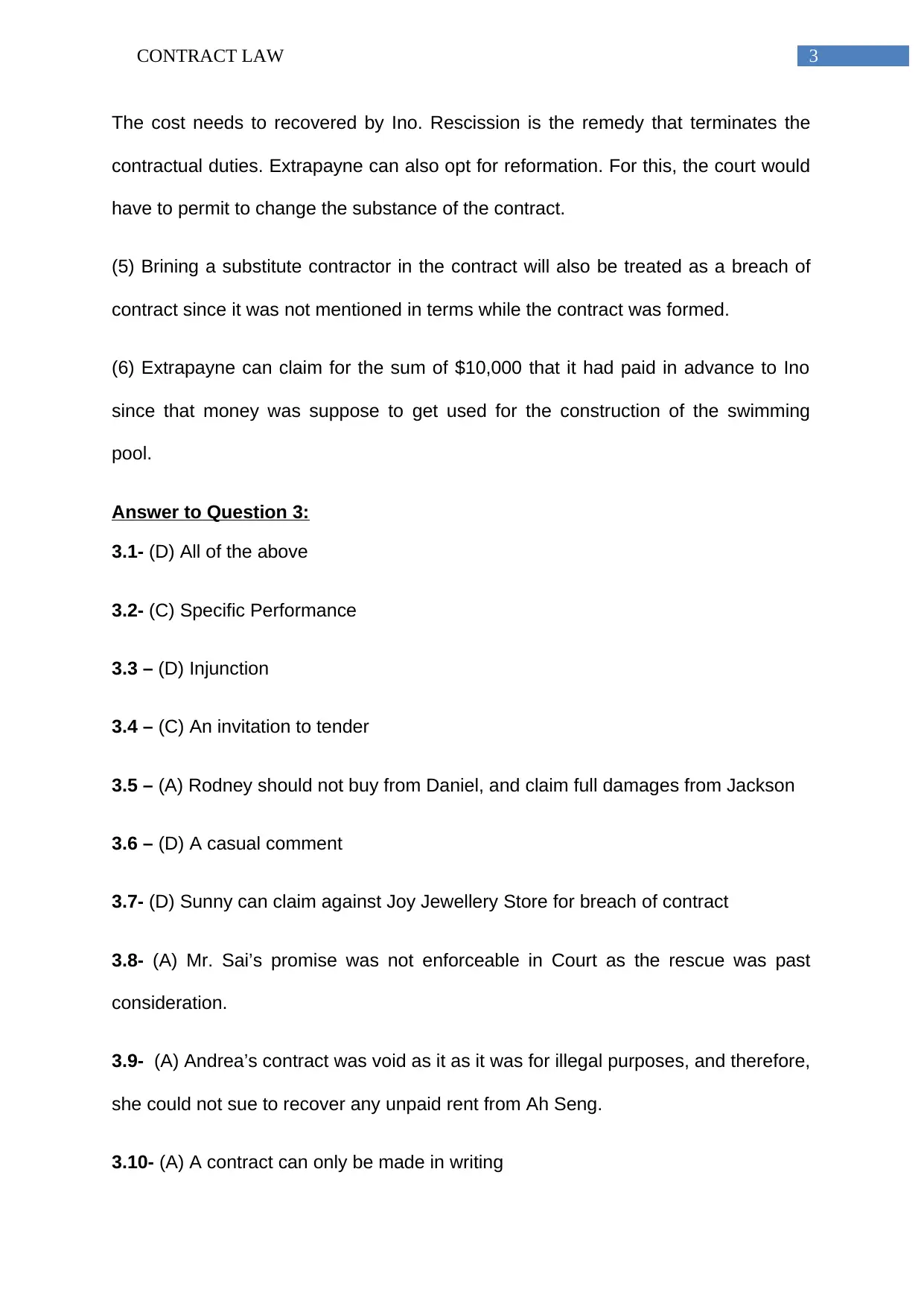
3CONTRACT LAW
The cost needs to recovered by Ino. Rescission is the remedy that terminates the
contractual duties. Extrapayne can also opt for reformation. For this, the court would
have to permit to change the substance of the contract.
(5) Brining a substitute contractor in the contract will also be treated as a breach of
contract since it was not mentioned in terms while the contract was formed.
(6) Extrapayne can claim for the sum of $10,000 that it had paid in advance to Ino
since that money was suppose to get used for the construction of the swimming
pool.
Answer to Question 3:
3.1- (D) All of the above
3.2- (C) Specific Performance
3.3 – (D) Injunction
3.4 – (C) An invitation to tender
3.5 – (A) Rodney should not buy from Daniel, and claim full damages from Jackson
3.6 – (D) A casual comment
3.7- (D) Sunny can claim against Joy Jewellery Store for breach of contract
3.8- (A) Mr. Sai’s promise was not enforceable in Court as the rescue was past
consideration.
3.9- (A) Andrea’s contract was void as it as it was for illegal purposes, and therefore,
she could not sue to recover any unpaid rent from Ah Seng.
3.10- (A) A contract can only be made in writing
The cost needs to recovered by Ino. Rescission is the remedy that terminates the
contractual duties. Extrapayne can also opt for reformation. For this, the court would
have to permit to change the substance of the contract.
(5) Brining a substitute contractor in the contract will also be treated as a breach of
contract since it was not mentioned in terms while the contract was formed.
(6) Extrapayne can claim for the sum of $10,000 that it had paid in advance to Ino
since that money was suppose to get used for the construction of the swimming
pool.
Answer to Question 3:
3.1- (D) All of the above
3.2- (C) Specific Performance
3.3 – (D) Injunction
3.4 – (C) An invitation to tender
3.5 – (A) Rodney should not buy from Daniel, and claim full damages from Jackson
3.6 – (D) A casual comment
3.7- (D) Sunny can claim against Joy Jewellery Store for breach of contract
3.8- (A) Mr. Sai’s promise was not enforceable in Court as the rescue was past
consideration.
3.9- (A) Andrea’s contract was void as it as it was for illegal purposes, and therefore,
she could not sue to recover any unpaid rent from Ah Seng.
3.10- (A) A contract can only be made in writing
Paraphrase This Document
Need a fresh take? Get an instant paraphrase of this document with our AI Paraphraser
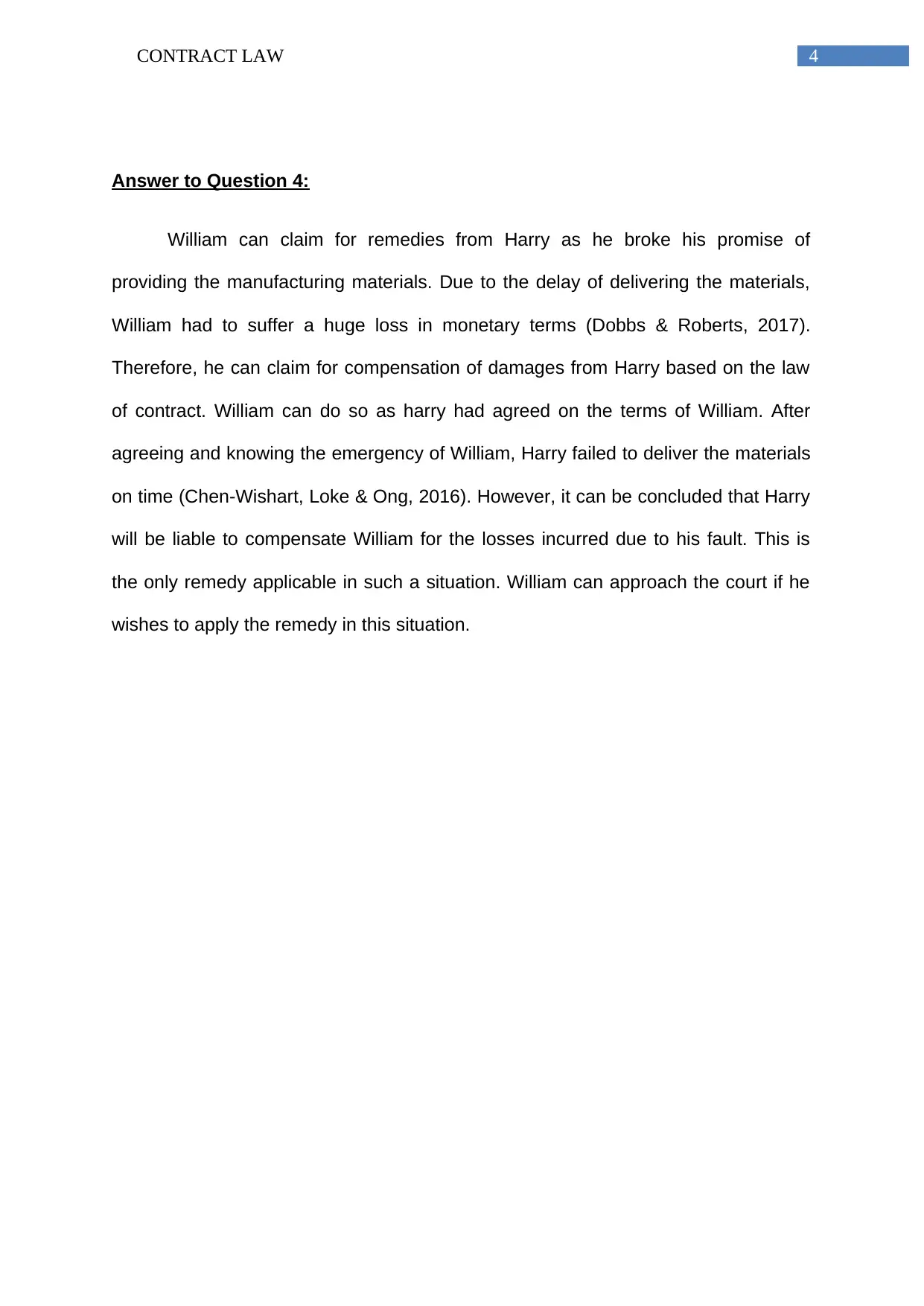
4CONTRACT LAW
Answer to Question 4:
William can claim for remedies from Harry as he broke his promise of
providing the manufacturing materials. Due to the delay of delivering the materials,
William had to suffer a huge loss in monetary terms (Dobbs & Roberts, 2017).
Therefore, he can claim for compensation of damages from Harry based on the law
of contract. William can do so as harry had agreed on the terms of William. After
agreeing and knowing the emergency of William, Harry failed to deliver the materials
on time (Chen-Wishart, Loke & Ong, 2016). However, it can be concluded that Harry
will be liable to compensate William for the losses incurred due to his fault. This is
the only remedy applicable in such a situation. William can approach the court if he
wishes to apply the remedy in this situation.
Answer to Question 4:
William can claim for remedies from Harry as he broke his promise of
providing the manufacturing materials. Due to the delay of delivering the materials,
William had to suffer a huge loss in monetary terms (Dobbs & Roberts, 2017).
Therefore, he can claim for compensation of damages from Harry based on the law
of contract. William can do so as harry had agreed on the terms of William. After
agreeing and knowing the emergency of William, Harry failed to deliver the materials
on time (Chen-Wishart, Loke & Ong, 2016). However, it can be concluded that Harry
will be liable to compensate William for the losses incurred due to his fault. This is
the only remedy applicable in such a situation. William can approach the court if he
wishes to apply the remedy in this situation.
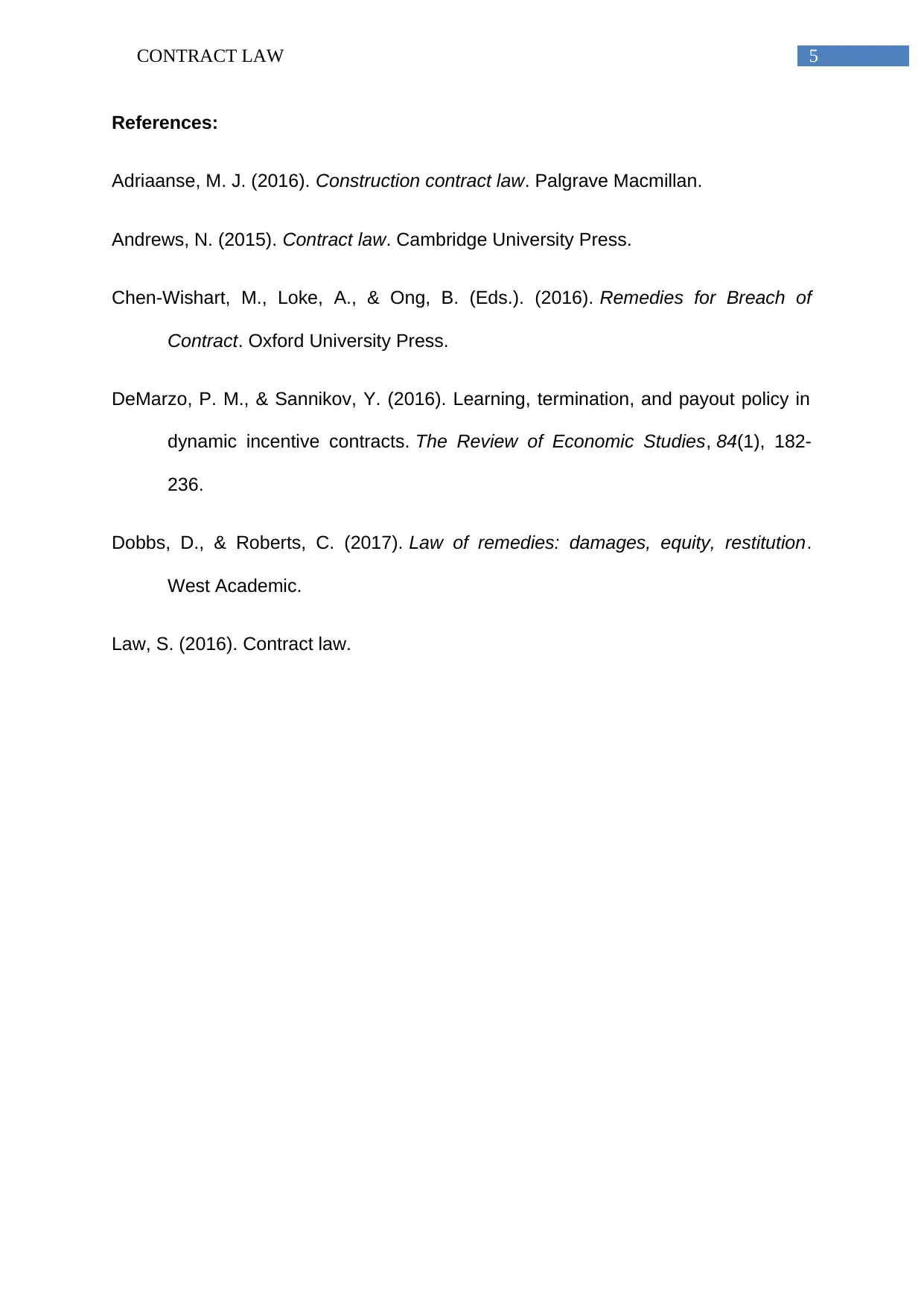
5CONTRACT LAW
References:
Adriaanse, M. J. (2016). Construction contract law. Palgrave Macmillan.
Andrews, N. (2015). Contract law. Cambridge University Press.
Chen-Wishart, M., Loke, A., & Ong, B. (Eds.). (2016). Remedies for Breach of
Contract. Oxford University Press.
DeMarzo, P. M., & Sannikov, Y. (2016). Learning, termination, and payout policy in
dynamic incentive contracts. The Review of Economic Studies, 84(1), 182-
236.
Dobbs, D., & Roberts, C. (2017). Law of remedies: damages, equity, restitution.
West Academic.
Law, S. (2016). Contract law.
References:
Adriaanse, M. J. (2016). Construction contract law. Palgrave Macmillan.
Andrews, N. (2015). Contract law. Cambridge University Press.
Chen-Wishart, M., Loke, A., & Ong, B. (Eds.). (2016). Remedies for Breach of
Contract. Oxford University Press.
DeMarzo, P. M., & Sannikov, Y. (2016). Learning, termination, and payout policy in
dynamic incentive contracts. The Review of Economic Studies, 84(1), 182-
236.
Dobbs, D., & Roberts, C. (2017). Law of remedies: damages, equity, restitution.
West Academic.
Law, S. (2016). Contract law.
⊘ This is a preview!⊘
Do you want full access?
Subscribe today to unlock all pages.

Trusted by 1+ million students worldwide
1 out of 6
Related Documents
Your All-in-One AI-Powered Toolkit for Academic Success.
+13062052269
info@desklib.com
Available 24*7 on WhatsApp / Email
![[object Object]](/_next/static/media/star-bottom.7253800d.svg)
Unlock your academic potential
Copyright © 2020–2026 A2Z Services. All Rights Reserved. Developed and managed by ZUCOL.




